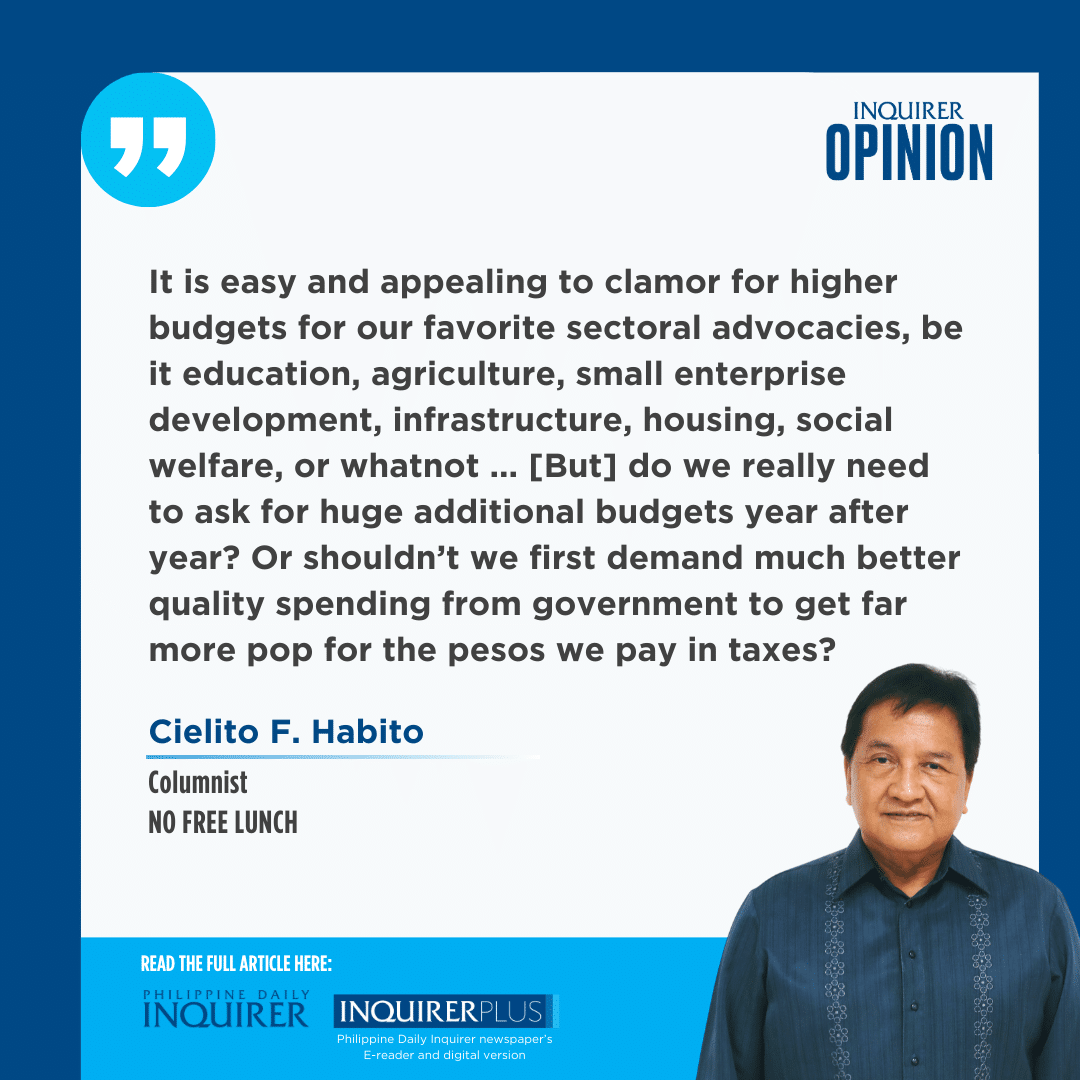More pop for the peso
How do we get more pop for the peso—my “Filipinized” version of the American idiom “bang for the buck”—in the way our public servants use (or misuse) our hard-earned taxes? Most people tend to inordinately focus on the quantity of revenues raised and budgets allocated by government. We tend to neglect, if not forget, that quality could possibly be of much greater consequence than quantity in both cases.
On the taxation side, quality of tax collection efforts (i.e., tax administration) is crucial. How well are our tax authorities able to collect all taxes due, based on existing tax laws, facing rampant tax evasion or tax avoidance by individual or corporate taxpayers, along with diversion of tax proceeds into pockets of revenue officials? When government needs more cash, creating new taxes or raising existing ones should be the last recourse, only after exhausting all possibilities for improved tax administration. Republic Act No. 11976 or the Ease of Paying Taxes Act sought to address this, but ridding our revenue agencies of graft and corruption that they have historically been notorious for should be the greater and more impactful imperative.
It’s on the public expenditures side that quality requires even more vigilance and action from us citizen taxpayers who are mostly voters, too. It is easy and appealing to clamor for higher budgets for our favorite sectoral advocacies, be it education, agriculture, small enterprise development, infrastructure, housing, social welfare, or whatnot. But how many of those crying for higher budgets for this or that agency bother to examine the annual audit reports on those agencies that the Commission on Audit (COA) routinely posts on its website? Do they realize that most government departments and agencies consistently manage to spend only a fraction of their allotted budgets in any given year? And that in their mad rush to prove that they deserve those budgets (and more), they would realign “savings” by November to far less productive but quick-disbursing uses, just to be able to spend the money quickly?
A popular quick-disbursing item would be year-end employee bonuses variously termed “incentive,” “hazard,” “productivity,” “anniversary” or other allowances, which the agency employees would only be too happy to receive. For its part, the Department of Public Works and Highways (DPWH) has been repeatedly criticized by, among others, the Citizens Infrastructure Integrity WatchDog (InfraWatch), for seemingly needless “reblocking,” or tearing up road pavements to replace them with new pavement. Such a project is currently underway in a stretch of mountain road in Los Baños, Laguna, where I live, informally called the Jamboree or Magnetic Road that is classified as a national road, hence under the care of DPWH rather than the local government. Even local government officials I’ve talked to are puzzled by that ongoing work. I wrote six years ago about the questionable widening into four lanes of a short section of this same road, which only sees sparse traffic even with two lanes (“When infra spending goes nowhere,” 7/10/18). Now, a portion of that road is being reblocked, even as the pavement had shown no sign of major damage. As InfraWatch has argued for years, many urgent road construction or repairs clearly merit greater priority over reblocking of still good road pavements that DPWH seemingly likes to do. A reader once wrote that beyond road reblocking, state auditors should also watch out for unnecessary cementing of road shoulders, planter box construction, culvert laying, cementing of riverbanks, and bridge repair, seeming DPWH favorites for spending money quickly.
Indeed, the 2022 COA annual audit report for DPWH shows interesting numbers. For road maintenance, rehabilitation, or upgrading, DPWH reportedly overshot their target total length of 912 kilometers by 74 km. And yet COA reported that only 64 percent of those projects were “completed according to plans and specifications.” More needless reblocking? On the other hand, out of a target of 1,252 km for new road construction or widening, less than a third or only 386 km were reported completed or ongoing at year’s end. The COA report for the Department of Transportation shows similar results. All told, both departments only managed to disburse 61-65 percent of their total allocations for the year (it went as low as 26 percent in past years), which pressures them to move money fast, no matter what. And then there’s the estimate quoted from the Office of the Ombudsman that around 20 percent of annual government appropriations is lost to corruption.
Do we really need to ask for huge additional budgets year after year? Or shouldn’t we first demand much better quality spending from government to get far more pop for the pesos we pay in taxes?
————–
cielito.habito@gmail.com





















